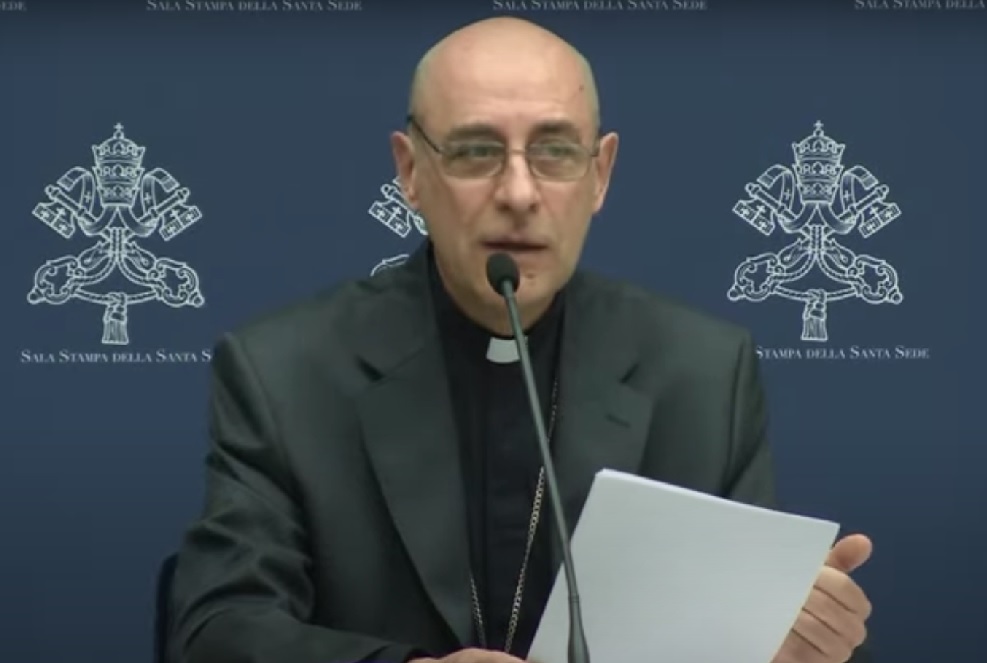'Infinite Dignitas': from war to bioethics: the faces of violated humanity
The Dicastery for the Doctrine of the Faith released a new doctrinal declaration on the respect due to the person "beyond all circumstances”. It says no to any attempt to weaken human rights for those who are most vulnerable, but also to any attempt to obscure the sexual difference between men and women. For Cardinal Fernandez, it provides an overview on human beings.
Vatican City (AsiaNews) – The Prefect of the Dicastery for the Doctrine of the Faith Card Victor Manuel Fernandez today presented the new declaration Dignitas Infinita at a press conference in the Vatican. Approved by Pope Francis, it was signed by the cardinal and the dicastery’s secretary, Monsignor Armando Matteo.
The document says that, for the Catholic Church, every person is “created in the image and likeness of God and redeemed in Jesus Christ” and is the bearer of his or her own "inalienable dignity.” This principle “prevails in and beyond every circumstance, state, or situation the person may ever encounter”, and does not admit that society may consider some violations less serious than others.
In 2019, the Dicastery, then still known as the Congregation for the Doctrine of the Faith, begun working on the text focusing on the indispensability of the concept of the dignity of the human person within Christian anthropology.
This issue is entangled with today's debate on human rights, on the 75th anniversary of the Universal Declaration, which Pope John Paul II described as a "milestone" in the journey of the human race.
Today, however, there is a risk of "misconceptions" and partial readings of this important text, which can even limit the scope of the idea that every person is by nature the bearer of dignity that can never be cancelled.
For this reason, Dignitas Infinita emphasises the need for truly unconditional respect for the dignity of every person. “Some people propose that it is better to use the expression ‘personal dignity’ (and the rights ‘of the person’) instead of ‘human dignity’ (and the rights ‘of man’) since they understand a ‘person’ to be only ‘one who is capable of reasoning’,” reads the text.
“They then argue that dignity and rights are deduced from the individual’s capacity for knowledge and freedom, which not all humans possess. Thus, according to them, the unborn child would not have personal dignity, nor would the older person who is dependent upon others, nor would an individual with mental disabilities.”
The Church, on the other hand, “insists that the dignity of every human person, precisely because it is intrinsic, remains ‘in all circumstances.’ The recognition of this dignity cannot be contingent upon a judgment about the person’s ability to understand and act freely; otherwise, it would not be inherent in the person, independent of the individual’s situation, and thus deserving unconditional respect.”
Based on this fundamental premise, the document in its final part points to some of “the grave violations of human dignity in our time.”
Pope Francis expressly asked the Dicastery for the Doctrine of the Faith to focus on 13 areas; in fact, “the document highlight topics closely connected to the theme of dignity, such as poverty, the situation of migrants, violence against women, human trafficking, war, and other themes.”
“[I]f some people are born into a country or family where they have fewer opportunities to develop, we should acknowledge that this is contrary to their dignity, which is the same dignity as that of those born into a wealthy family or country.”
This same gaze leads the Church to reiterate that abortion too is a violation of the dignity of the person, as is euthanasia, because “no circumstances [exist] under which human life would cease from being dignified and could, as a result, be put to an end”.
The "throwaway culture” is also a grave violation of human dignity by marginalising “those experiencing physical or mental limitations”.
Dignitas Infinita also cites “gender theory” among possible ambiguities. On the one hand, the Vatican document maintains that “human dignity” is violated “in some places” where “people are imprisoned, tortured, and even deprived of the good of life solely because of their sexual orientation.” On the other, it rejects "the claims of new rights" and the obscuring of the “reference to the ineliminable sexual difference between man and woman”.
It also affirms that the safeguarding of human dignity also passes through respect for the dignity of one's own body, and by virtue of this, it defines any sex change operation as a threat to the “unique dignity the person has received from the moment of conception.”
“Dignitas infinita is an invitation to look at the theme of the dignity of the person as a whole, not stopping at just one theme or another, as if one aspect could be considered less important than the others," said Card Fernandez at the press conference.
As the document notes, the very idea of human dignity “helps to overcome the narrow perspective of a self-referential and individualistic freedom that claims to create its own values regardless of the objective norms of the good and of our relationship with other living beings.”
08/01/2024 17:10







.png)










